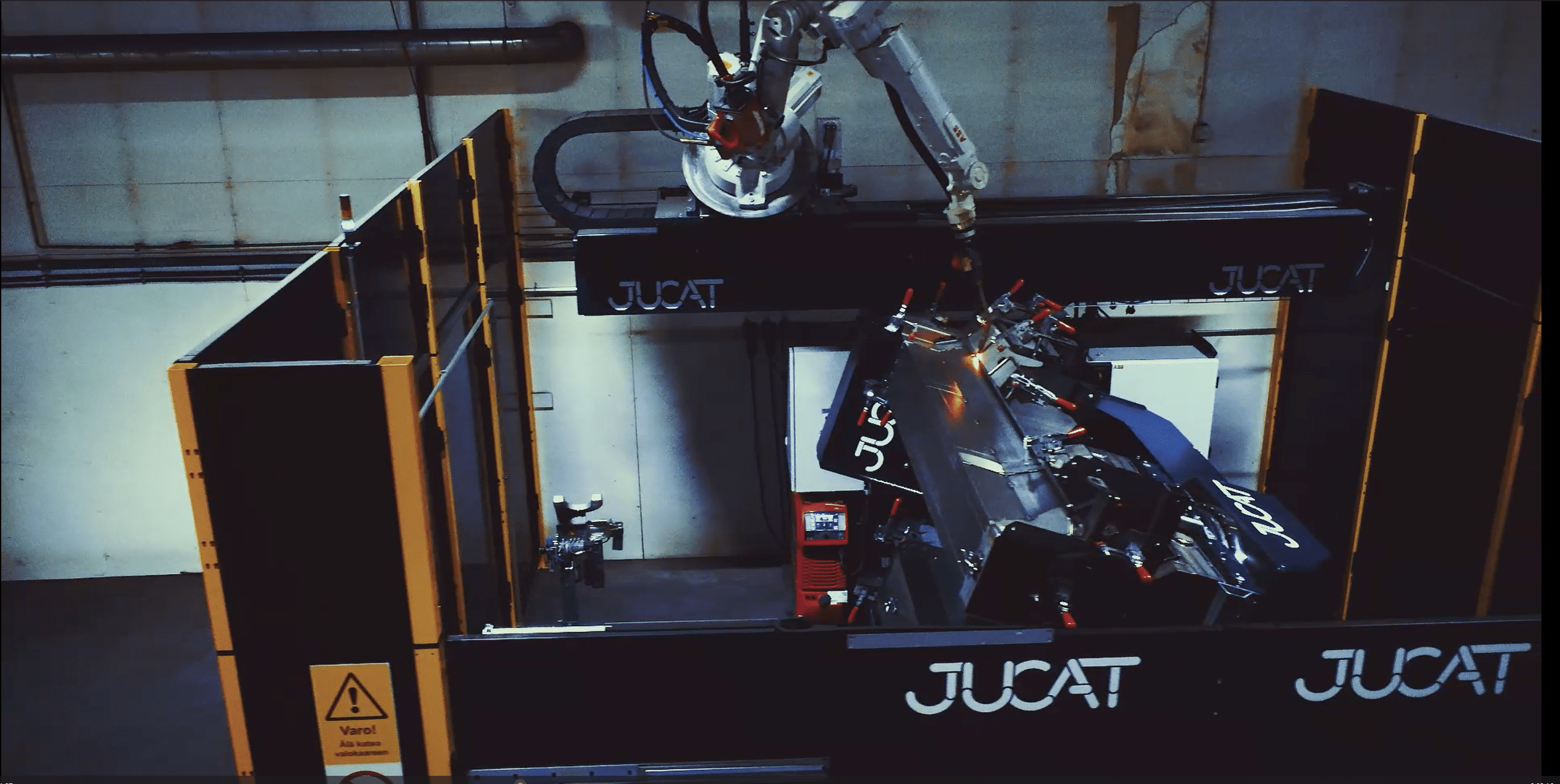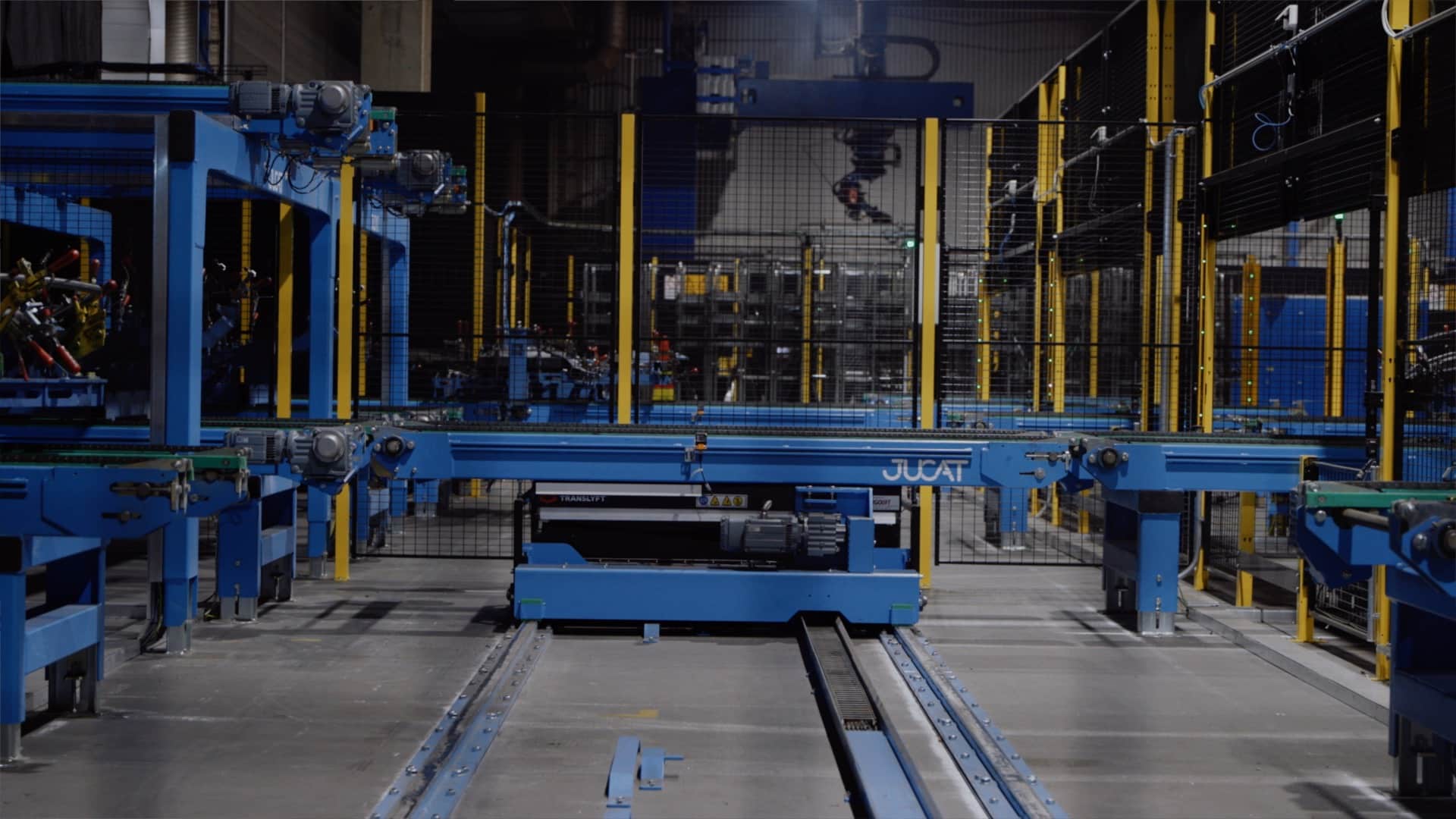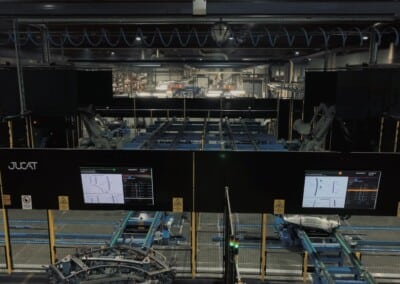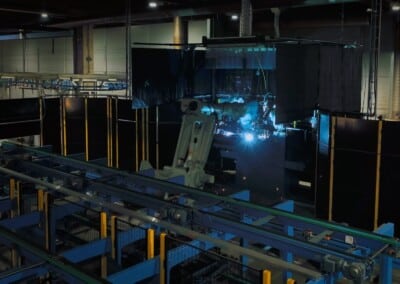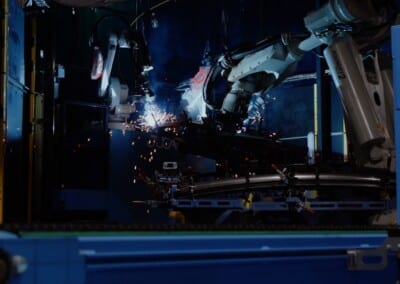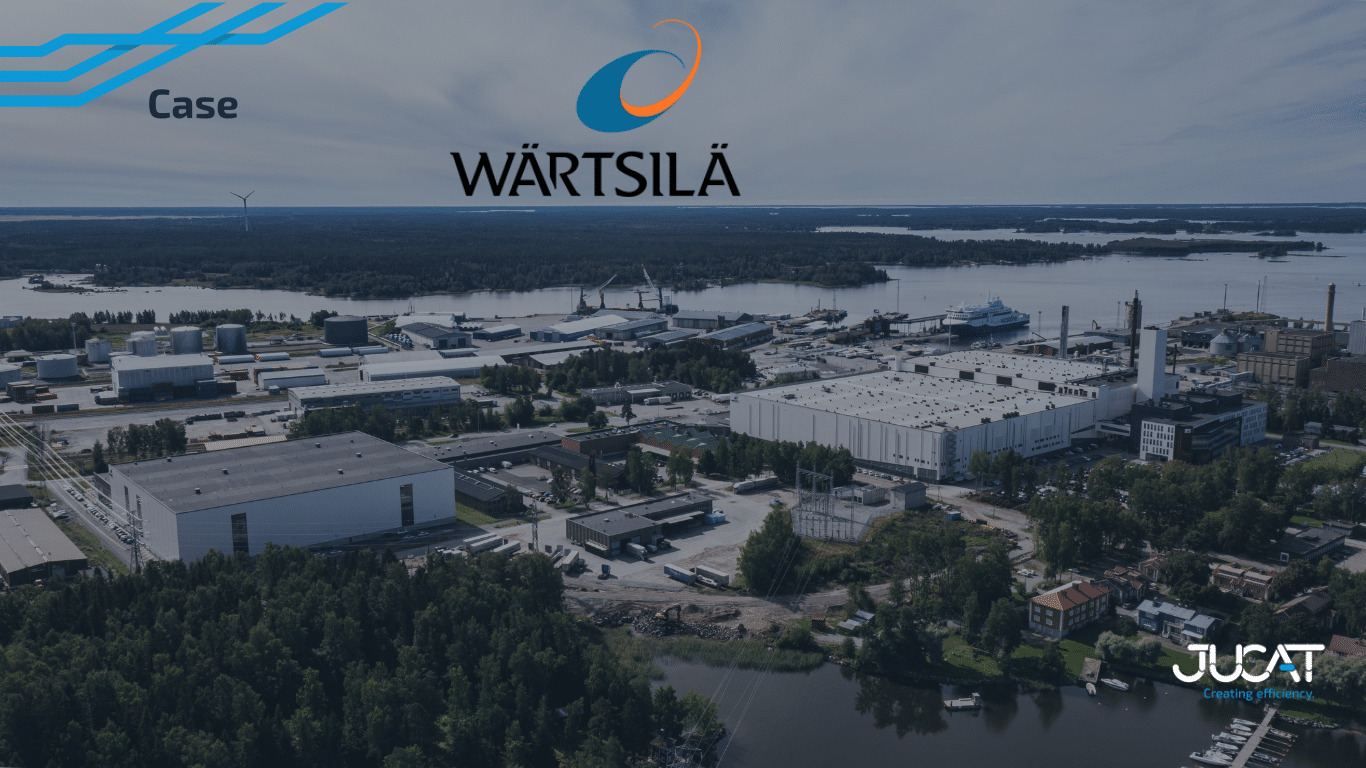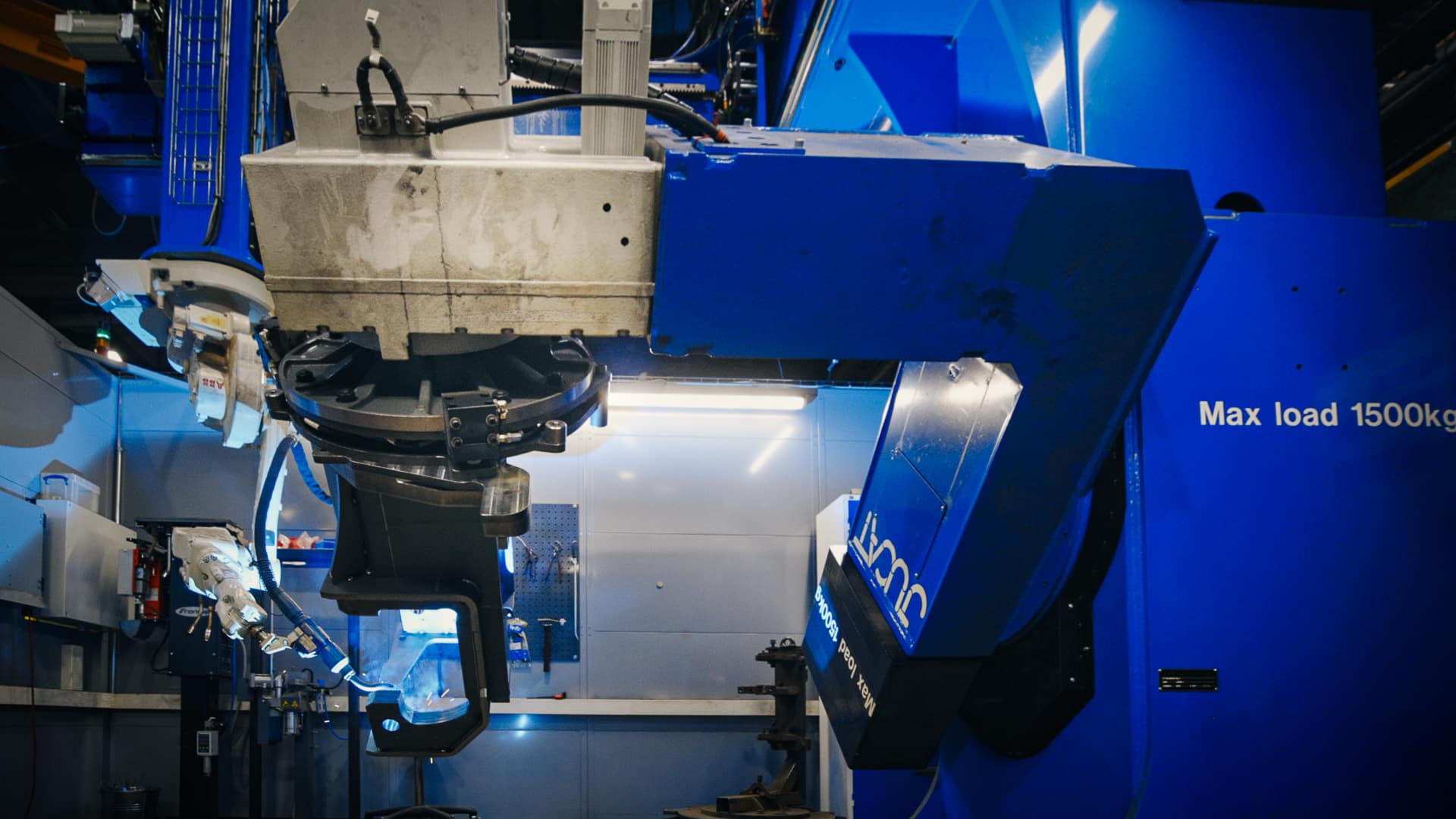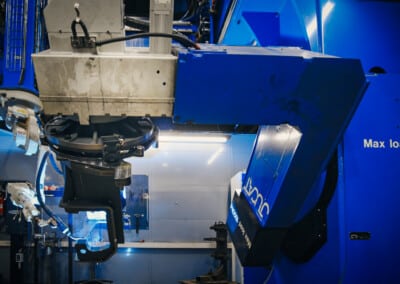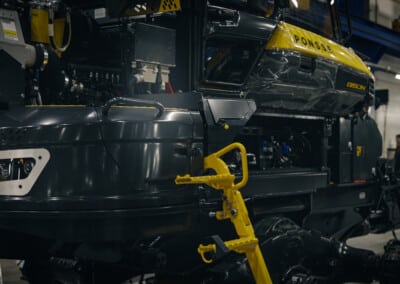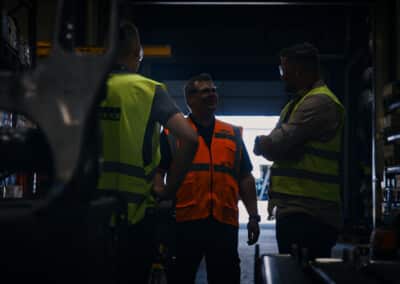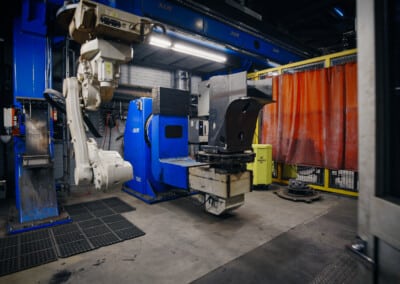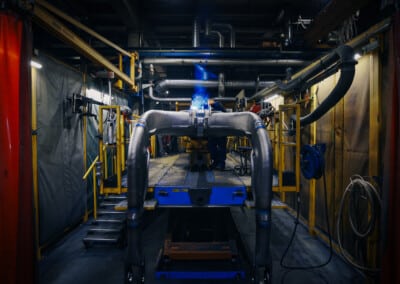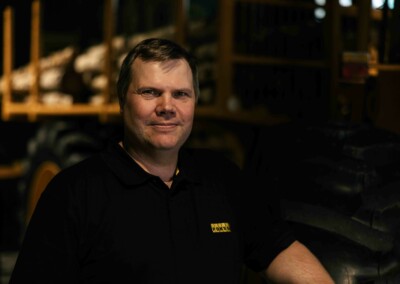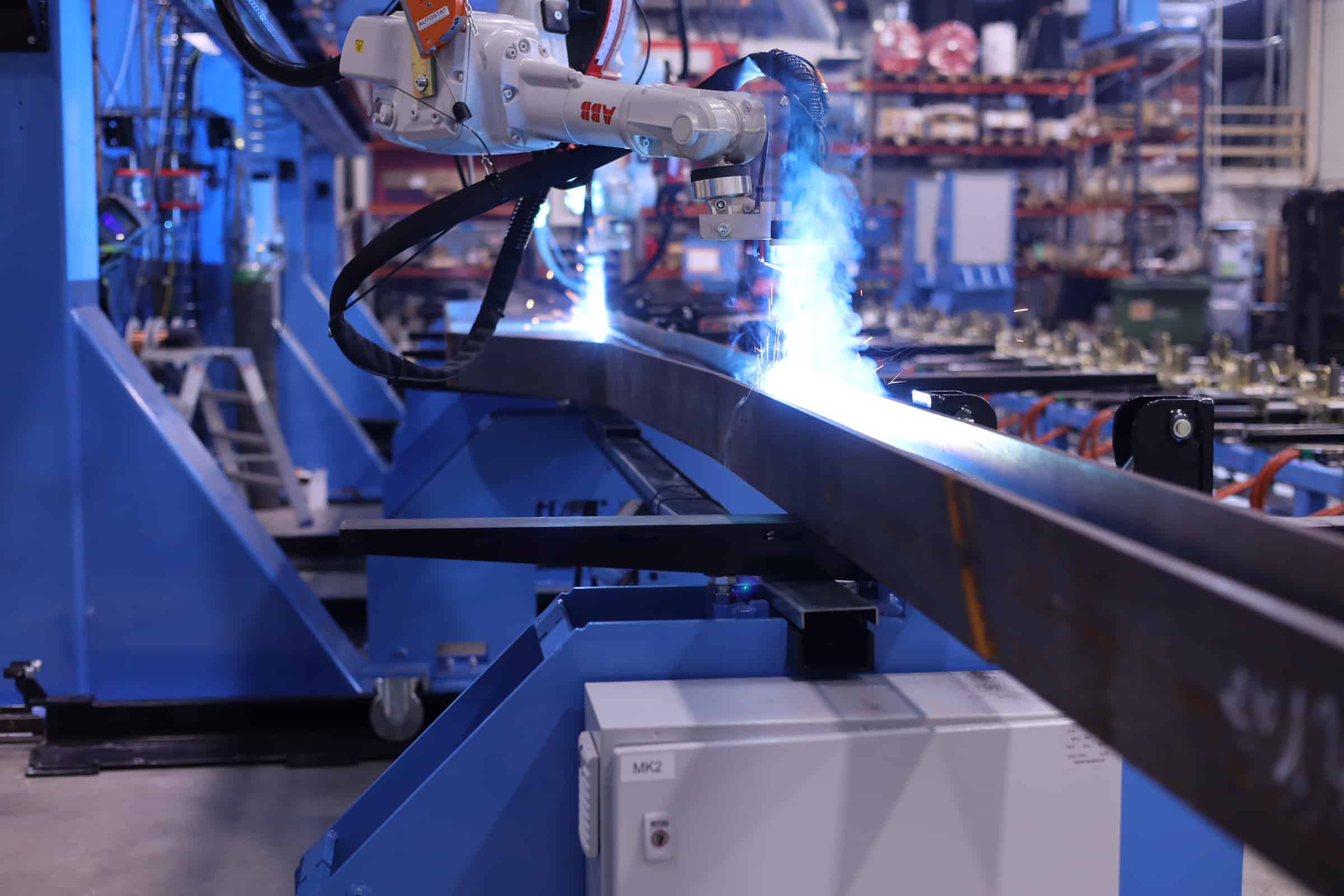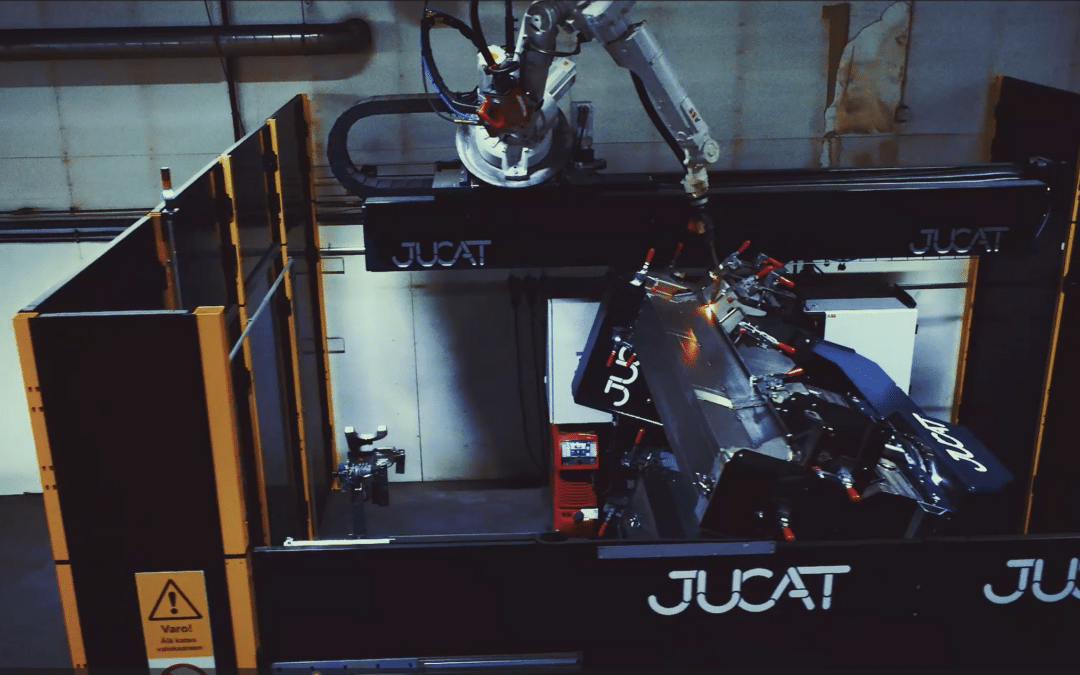
by Iiro Panula | Dec 17, 2024
TP Silva
Efficiency and versatility in a small package: the EzWeld robotic cell enables TP Silva to weld efficiently and a wide range of products in the same compact station, faster and with better quality than before.
TP Silva Oy is one of the international market leaders in the manufacture of firewood engines and their accessories. The company operates under the domestic brands Hakki Pilke, Palax and Japa, with decades of experience in the manufacture and development of firewood engines. The company’s wide range of products includes high-quality and reliable firewood burning machines and their accessories for both recreational users and industrial-scale operators. Around 70% of the company’s production is exported and its equipment is a well-known and respected tool for woodworkers in more than 35 countries.
TP Silva Oy, a manufacturer of professional firewood machines, took a significant step towards higher quality and more productive production by investing in a new robotic station. The company’s main objective was to modernise its production machinery, improve efficiency and achieve better quality.
“Everything has gone as agreed. Problems have been solved easily and there have been no major challenges,” says Ilkka Remes, Method Development and Robot Automation Manager, about the project with Jucat.
Renewing the Old Robot Stations
With the old robot stations reaching the end of their lifecycle, TP Silva began searching for a solution to enhance production efficiency and quality.
The company manufactures three well-known brands: Hakkipilke, Japa, and Palax, whose products vary significantly in size. This placed specific demands on the new robot station.
Jucat was selected as a partner due to their offer, which addressed TP Silva’s needs well. The station supplied by Jucat allows versatile welding and is suitable for products of all sizes.
Smooth Project Execution and RobotStudio Modeling
The project implementation has gone smoothly. TP Silva has consistently received up-to-date information from Jucat about the project’s progress. Any challenges have been resolved quickly and efficiently. With the help of RobotStudio software, issues can be identified early through modeling and testing, reducing risks during production.
Improved Quality and Productivity
The new robot station has brought significant advantages to TP Silva:
- Quality has improved significantly, especially in thin sheet metal welding.
- The reduction of weld spatter improves product finishing and shortens production time.
- With the CMT welding system, the welding speed for thin sheet metal has increased, further boosting productivity.
The greatest benefit of robotic welding is its consistent quality and repeatability. Unlike manual welding, where quality can vary, robots ensure a steady and reliable outcome.
“Quality and repeatability is definitely the most important thing in robotic welding. The welder welds and the welder has bad days and has good days, but the consistent quality of the robot is the absolute key to what it delivers.”
A Recommendation for Jucat
TP Silva is satisfied with Jucat’s performance and the successful project execution. The company states that cooperation has been smooth and all agreements have been honored.
“It’s easy to recommend Jucat as a partner to others,” Remes summarizes their experience.
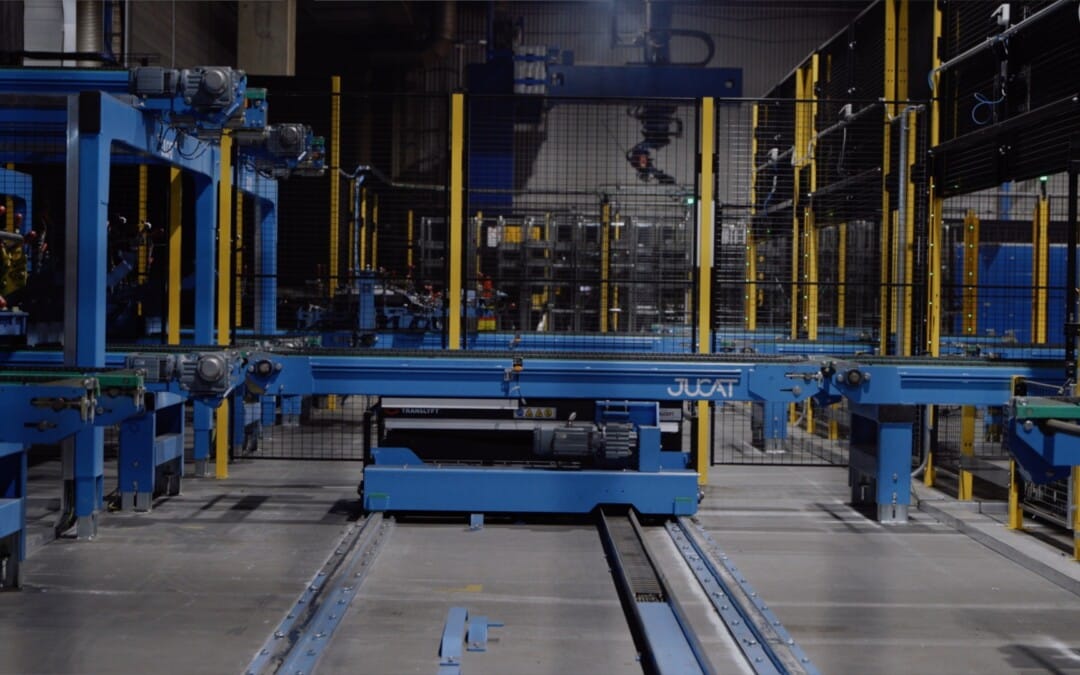
by Iiro Panula | Feb 20, 2024
MSK Cabins
Trust and cooperation played a key role: a robotic welding cell was installed in just four weeks, starting from the foundations
MSK Cabins Oy is part of the MSK Group, a family-owned group of six industrial companies in three countries, in addition to the parent company. MSK Cabins Oy manufactures safety cabs for agricultural machinery, including Valtra tractors, which operate worldwide. Jucat and MSK Group had previously worked together on smaller projects, and the investment in the welding cell significantly deepened their joint journey.
MSK Group is a steadily growing, diversified, high-tech family business. However, at MSK Cabins, a manufacturer of safety cabins for industrial machinery, some of the main production equipment was beginning to reach the end of its life cycle. It was clear that major investments in equipment would be needed in the near future.
The choice of solution provider was based on the desire to invest in advanced technology, productivity and safety at work. The location of the supplier was also an important selection criterion, as access to support and maintenance services was seen as an advantage for the future. However, the most important factor was reliability.
“We have a period of practically four weeks each year when old equipment can be dismantled and new equipment can be installed and run in. We have to make sure that production can start without a problem after the four weeks of installation work. So when choosing a partner, we had to pay special attention to reliability,” says Mikko Kuivamäki, Technical Manager at MSK Cabins.
High-tech robotic welding cell deployed in just four weeks
This was the first phase of a challenging and long-term project. Its aim was to improve productivity, eliminate maintenance downtime and improve welding quality by modernising the equipment. The scale of the project was significant for both MSK Cabins and Jucat.
For a project of this magnitude, the four-week schedule is inherently tight, which had to be carefully kept in mind from the outset. The MSK Cabins team already had a preliminary idea of the operating model for the new stations. Jucat brought new ideas and technologies to the table, such as ABB welding robots and Fronius welding equipment. The benefits of the whole have been undeniable.
“Jucat supplied us with a completely new type of robotic welding station. The solution significantly improved our productivity and safety at work, and at the same time we upgraded our ERP connection to meet today’s requirements. We have been very pleased with our cooperation,” Kuivamäki sums up the results of the collaboration.
The second phase of the project is already planned, with the aim of further improving the automation level of the equipment.
Close cooperation, excellent project management and technological know-how were key factors
The project seamlessly combined cooperation between the teams of both companies, excellent project management and strong expertise in automation solutions. The Jucat team’s short response time to requests, adjustments and wishes was also praised. The combination of these factors resulted in a significant competitive advantage for MSK Cabins, strengthening the company’s position in the market. Kuivamäki singles out three factors in particular that ensured the success of the project and the return on investment:
“We have found a partner we can trust. Jucat has a really hard-working team and excellent project management. It was easy for us to follow the progress and details of the work throughout the project. I think there are a few key factors for the success of this project. One of them is the really close cooperation between the MSK and Jucat teams. The project management was also excellent. These things combined with the high level of technology I think is the right way to go.
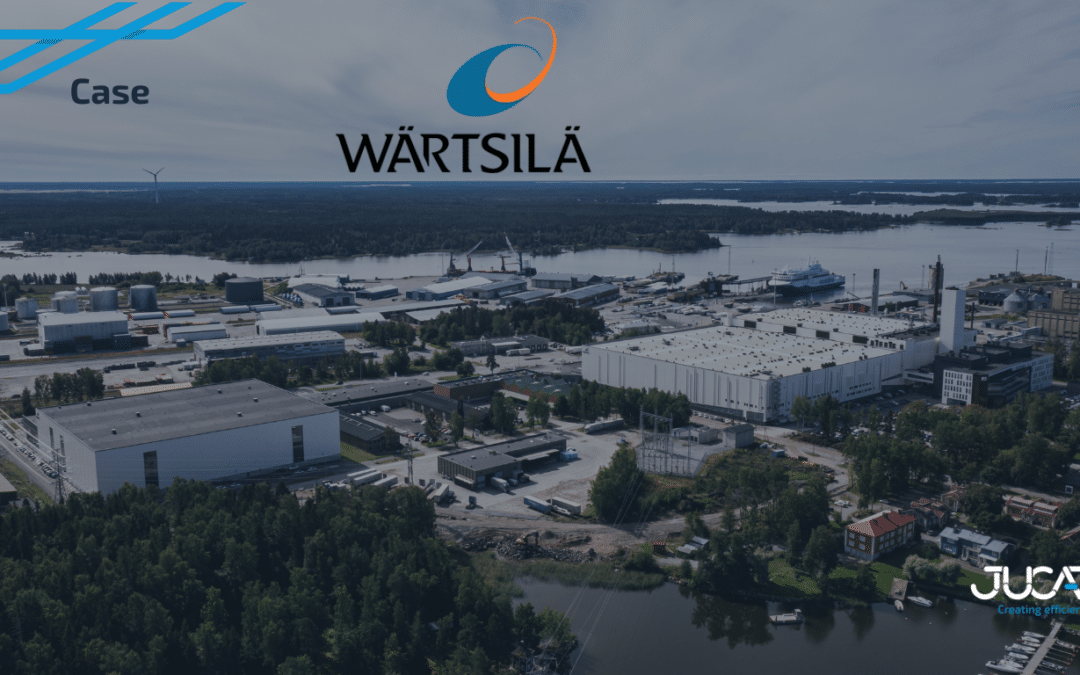
by Ville Rintala | Dec 7, 2023
Wärtsilä
New rotation solutions for large components are born from an innovative approach
Wärtsilä Corporation is a supplier of innovative technology and lifecycle solutions and a market leader in the marine and energy markets.
New rotation solutions for large components are born from an innovative approach
Wärtsilä is known for its pioneering technological solutions in the energy and marine industries. The company is committed to continuous innovation and sustainable development, as demonstrated by its investments in multi-fuel engines, environmentally friendly energy solutions and smart digital applications.
Wärtsilä’s collaboration with Jucat dates back to 2015, when the company was looking for a solution to rotate large, heavy pieces. At the time, many factors influenced the choice of supplier, but one major factor in the continued collaboration is the open-mindedness towards new solutions – a characteristic shared by both companies:
“Jucat has been a good supplier from the start. They have been as open-minded about new technologies as we are. Over the years we have purchased several pieces of equipment from them, the first of which is still in active production,” says Jussi Laulaja, Wärtsilä’s development engineer.
Jussi Laulaja main role is as a project manager for automation projects in component manufacturing, and he has therefore been the contact person for most of Jucat’s and Wärtsilä’s projects.
At the heart of cooperation is the rotation of large and heavy pieces
Wärtsilä’s component manufacturing operations involve a large number of large, heavy and precision parts, and the selection of partners has therefore placed particular emphasis on the skills and technology required to meet this need. Jucat equipment has always been able to meet the company’s projects, even when the solution required customisation and a new way of doing things. Local presence also brings many advantages, not only in terms of maintenance but also in terms of potential problems. Help is available quickly.
On a day-to-day level, the solutions provided by Jucat are reflected in improved efficiency, improved quality performance and improved safety and ergonomics at work. The elimination of the need to rotate pieces on the cranes, which is directly reflected in the well-being and productivity of the workers.
High-tech robotics for a motorised washing machine
In 2021, Jucat provided Wärtsilä with a completely new solution for the company’s new Sustainable Technology Hub in Vaasa, Finland. A washing system was needed to wash engine blocks and other large components, and Jucat supplied the transfer and rotation equipment and robotics for this system. These days, component cleanliness requirements are high and constantly increasing. According Laulaja, the solution required high-tech equipment that could also meet these criteria.
“Jucat has taken an open-minded approach to offering us challenging packages. They have always been brave and very active. In the case of the block washer, we first carried out extensive preliminary work on the project with Jucat, which then formed the basis for formulating and implementing the solution. There are not many suppliers of such a package who are brave enough to take up the challenge. They have always delivered what they promised, which has been important to us,” says the Jussi Laulaja.
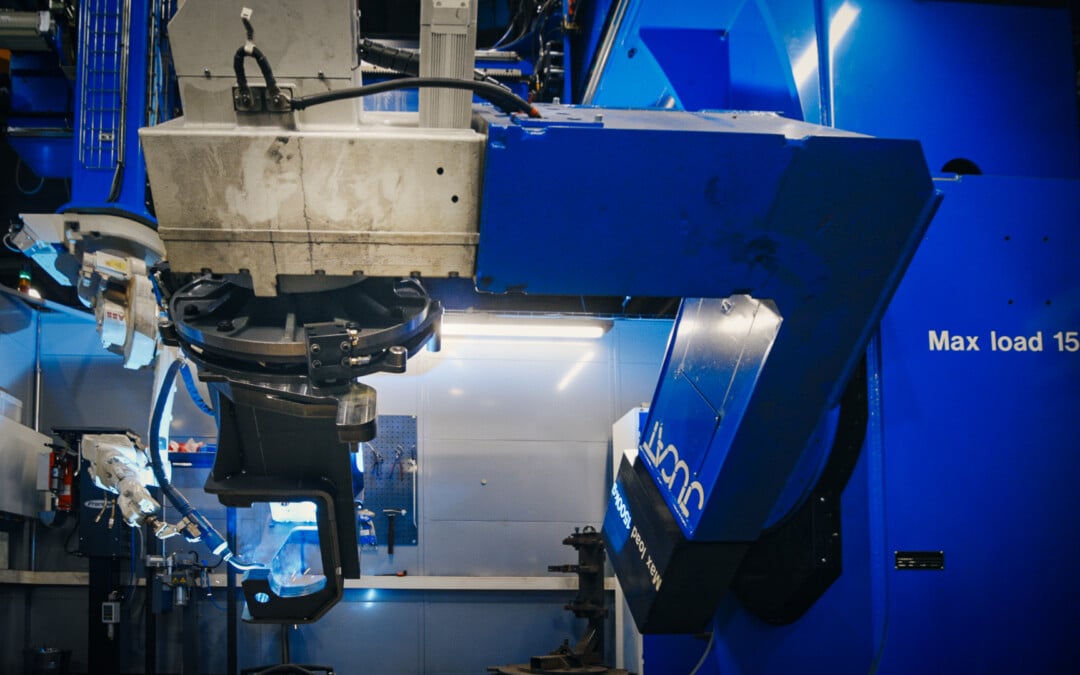
by Myynninmaailma | Sep 7, 2023
Ponsse
Responsible collaboration for specific machining needs
Ponsse, which specialises in cut-to-length forest machines, is one of the leading machinery manufacturers in its industry. Ponsse’s operations revolve around producing sustainable solutions for the benefit of their customers and the environment.
Responsible collaboration for specific machining needs
Ponsse, which specialises in cut-to-length forest machines, is one of the leading machinery manufacturers in its industry. Ponsse’s operations revolve around producing sustainable solutions for the benefit of their customers and the environment.
Collaboration with Jucat initially began with the need to develop frame production. Nowadays Ponsse’s production involves several of Jucat’s welding automation processes.
“Collaboration with Jucat has gone well. Ponsse is a very customer-oriented company, and we always want to keep our promises to our customers. We also want our goods suppliers and partners to share the same principles in their own operations. In this industry, Jucat is just as responsible a company as we are. They keep their promises and make things work,” says Ponsse’s production development manager, Heikki Selkälä.
Device configurability and customer orientation are key
Ponsse’s devices have peak configurability, which means that the company can provide its customers with various devices to meet very specific needs. This means we are able to take into account the operating environment and types of wood processed by Ponsse’s customers, for example. Advanced equipment nevertheless requires advanced manufacturing technology.
“Jucat has helped us with welding automation in particular. We handle and position heavy parts during device manufacturing, and this is now easier to do. Jucat uses ABB robots in its welding cells. These robots can be highly configured to mean precise needs. Without these robot cells, it would be almost impossible to make these machines,” adds Selkälä, referring to the welding automation cells, which contain both positioners and welding robots.
Welding cells are a fixed and sustainable part of Ponsse’s production
Robots have created a new kind of working environment for Ponsse’s welders. The welders have become very familiar with working with the robots, as configuring and using the robots has been a part of their daily routine for years. According to Selkälä, investments in cells were also made with employees’ working conditions in mind:
“The robots have significantly changed the way that components are made in Ponsse’s production. When we invest in robot welding, one of the aims is to help our welders to get more out of their work for less.” Selkälä sums up the collaboration between the companies in a single sentence: “Jucat is a very customer-oriented company and its robot welding cells are well-made and durable.”
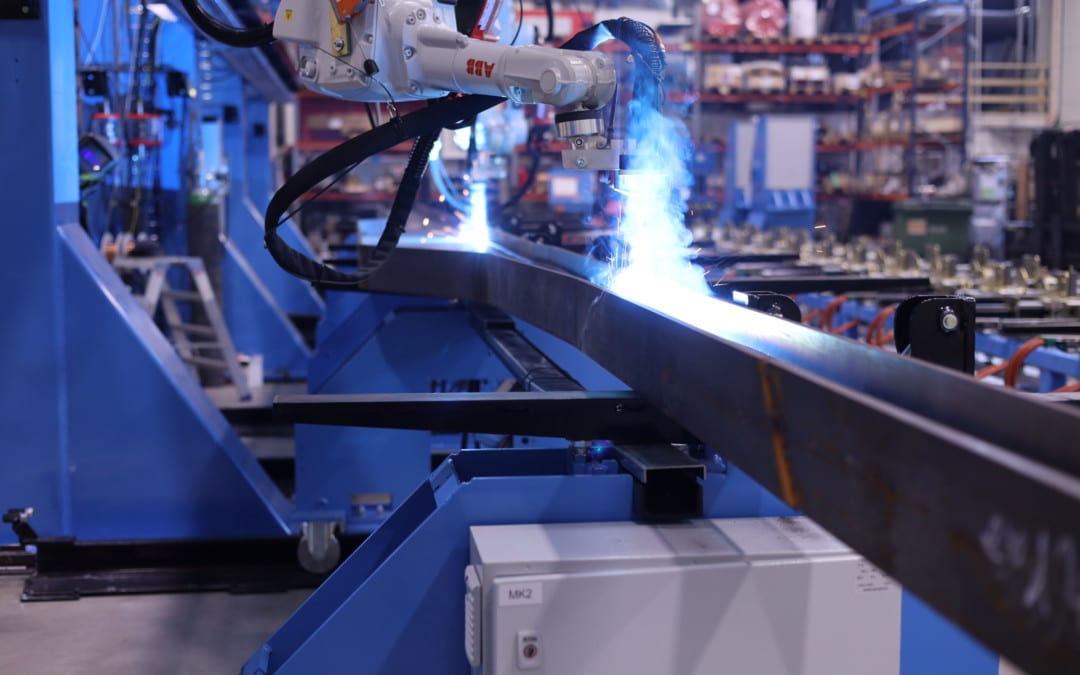
by Iiro Panula | Feb 23, 2023
Närko
New technology and automation bring significant benefits to chassis production
Oy Närko Ab (later Närko) is one of the leading trailer and superstructure manufacturers in the Nordic countries. The company’s production and sales companies are located in the Nordic countries and their trailers are in use throughout Europe. Närko’s subsidiaries are Oy Närko Finland Ab in Finland and Svenska Närko Ab and Atrans Ab in Sweden. There is also an associated company Norske Närko in Norway. Närko is part of the Nordic Närko Group.
New technology and automation bring significant benefits to
chassis production
The cooperation between Jucat and Närko started some years ago when Jucat supplied Närko with welding solutions for production. However, as the company’s production has grown and the previous equipment no longer served the current needs, the company decided in 2022 to invest in upgrading its frame beam welding process and technology.
The competition was open to a number of industry players, and in the end, Jucat’s solution was the one that everyone wanted to go for. The decision was also influenced by the positive experience of working with Jucat in the past and the practical knowledge that Jucat can deliver such solutions.
“We used to do quite a lot of work manually. We knew that it was time to do something new and modern and of course we want to improve all the time.
We had seen Jucat’s robotic station solutions, so we knew they had the capability to do this kind of solution. That started a discussion that we felt showed that we were on the way to finding a good solution for welding (truck) frame beams,” says Nicklas Pärus, CEO of Närko.
An easy solution, even though each product is different
The biggest challenge in the project was related to Närko’s product range: several products have the same design, but the individual dimensions vary. This could have meant, in the worst case, programming a separate welding program offline for each version, which would have been very time-consuming.
“The station must be efficient, work with different products and save time, but it must not be too difficult to use. If we tried to have too many versions of it, it would be too cumbersome. There were points during the project when we also had to develop our solutions and standardise them to make the new solution work well,” says Pärus of the solution’s evolution.
Parametric programming allowed us to define basic values for the products, as well as variable dimensions, whose paths are identified by the robot using laser scanning before welding begins. This makes it easy to weld products of a certain shape with varying widths, for example. Some special products are created along the way, but parametric programming covers up to 90% of the beam designs to be welded. So Pärus is confident that there is now a good solution for the company’s needs:
“We are confident that we have found a solution to our challenge that will last for years to come. The capacity of the machine is sized to last us for years. And new rules are constantly coming into play in traffic – for example, the law that came into force in 2019, which allowed longer trucks to be used in traffic. With the new solution, we can manufacture 20-metre-long bodies, which was not possible before.”
Smooth cooperation and active communication with the supplier
Pärus has been very satisfied with the cooperation with Jucat. The project resulted in a solution that has moved production forward as a whole – saving time, improving technology and increasing automation. He is confident that Jucat will continue to be the supplier of choice for future development needs.
“There are always things to be sorted out in projects like this, and especially in times like these, when even the availability of parts is a challenge, it’s the proactivity that is so important. We have always been well informed about where we are going, where we are on schedule and what the reasons are for any changes. We were kept up to date on the implementation on a weekly basis.”


